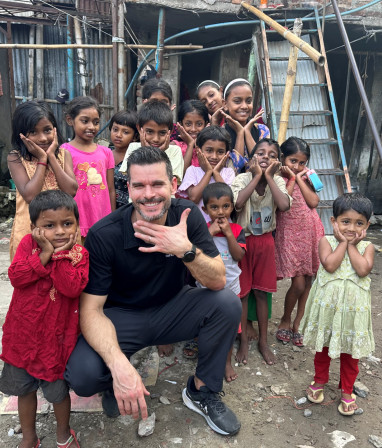Posted on 17 April 2025

TJ Grant, Associate National Director, World Vision New Zealand
Your recent visit to Bangladesh focused on modern slavery. What motivated the trip—and what stayed with you?
I went to Bangladesh not just to witness the scale of modern slavery, but to listen—to meet those caught in its web and learn from their lived realities. One moment that won’t leave me was meeting 13-year-old Saaj, working up to 16 hours a day in a garment factory. No school. No childhood. Just survival.
I carry his story with me, not as a memory, but as a mandate.
As a father, I couldn’t ignore the contrast between his life and that of my teenage sons in New Zealand. It reframed the issue from abstract injustice to personal urgency. This isn’t just happening somewhere else. It’s stitched into our clothing, built into our supply chains, and enabled by systems we’re part of.
What do you see as the greatest leadership challenge facing our sector—especially around issues like modern slavery?
Moral clarity. And the courage to act on it.
Too often, we confuse complexity with paralysis. But great leadership requires holding clarity at the centre—even when the path is messy. In our sector, that means staying laser-focused on justice while navigating diverse interests, political inertia, and public fatigue.
At World Vision, we’ve worked across coalitions, government agencies, businesses, and community groups to push for modern slavery legislation in Aotearoa. We’ve had to adapt strategies, forge unlikely alliances, and persist through delay after delay. But we haven’t lost sight of the end goal: systems where people matter more than profit.
That kind of clarity—anchored in purpose, agile in method—is what our sector needs more of.
What’s something you’re proud of from World Vision’s work in this space?
I’m proud that we haven’t just sounded the alarm—we’ve stayed in the room.
We’ve led pivotal reports like the Risky Goods analysis, worked with partners in the sector to mobilise grassroots campaigns, and built bridges between business leaders and lawmakers. But beyond any one initiative, it’s the consistency of our advocacy that I’m proud of and our team leading it.
You don’t change unjust systems with noise. You change them with persistent, principled leadership. That’s what our team models—steadfast, collaborative, and visionary.
What advice would you offer emerging leaders in the humanitarian and development space?
Lead from conviction, not just position.
The most effective leaders I know carry deep purpose. They don’t just clock in for a cause—they bleed for it. But they also know when to listen, when to rest, and when to bring others with them.
My advice:
- Stay close to the people you serve. Let their stories shape your decisions.
- Pursue learning relentlessly. Ask better questions. Reframe problems. Stretch your thinking.
- Lead with both spine and soul. Integrity will outlast every strategy.
And remember: this work is sacred. Keep your heart soft, your vision sharp, and your hope fierce.
Any recommended reads or resources for better understanding this issue?
I am always pursing good learning and reading to sharpen and expand my thinking. But more than anything, I recommend connecting with lived experience, sitting with stories—stories of children like Saaj, of migrant workers here in New Zealand, of communities pushing for dignity.
